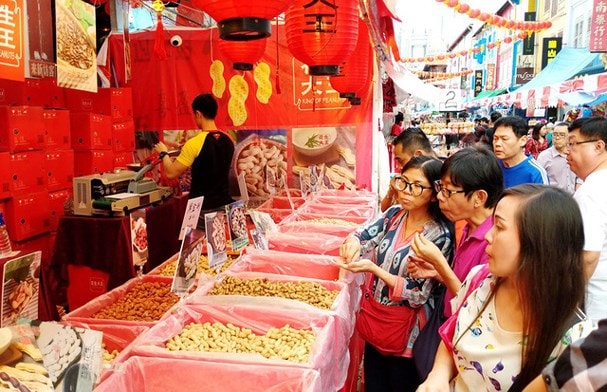Behind the story of Singapore giving lucky money to its people because of budget surplus
The Singapore government had a budget surplus of more than SGD 9.61 billion and used the surplus to give lucky money to the people. What made Singapore do this?
 |
| Singaporeans shopping in Chinatown. Photo: Le Nam |
But for many Singaporeans, the announcement that sales tax (SGT) will be increased by 2 percentage points over the next few years to offset a potential budget shortfall is the real concern.
From a bumper budget, also known as a budget surplus, on February 19, Finance Minister Heng Swee Keat, on behalf of the Singapore Government, announced that he would give each Singaporean aged 21 and above, depending on their income, a "lucky money" of 100-300 SGD.
The total amount of "lucky money" this time is up to 700 million SGD. This is the third time since 2008 that the government under Prime Minister Lee Hsien Loong has distributed "lucky money" to the people as a way to share the fruits of economic development with the people.
Dr. Vu Minh Khuong, Lecturer at the Lee Kuan Yew School of Public Policy (National University of Singapore), said that Singapore's budget surplus increased sharply in 2017 due to two main reasons: profit from investment in national reserves and real estate fees.
According to Mr. Huynh The Du, Fulbright University Vietnam, the increase in budget revenue leading to Singapore's sudden surplus mainly comes from the profits of the Monetary Authority of Singapore thanks to increased investments and increased revenue from stamp tax thanks to increased asset prices.
According to Mr. Du, those are unusual revenues, while the forecast of regular budget revenues is very close to reality.
"The Singapore government operates very effectively with a budget of less than 17% of GDP, much lower than the over 25% of GDP of high-income countries," said Mr. Huynh The Du, adding that the budget revenue to GDP ratio of Vietnam is up to 26%.
According to observers, the "lucky money" of several hundred USD for each citizen of a country with a GDP/capita of more than 80,000 USD is mainly symbolic.
This move could be like hitting two birds with one stone: reducing public criticism of the ruling party's policy of attracting skilled workers from abroad, which affects domestic jobs; and gaining points for the Finance Minister - a candidate for the upcoming Prime Minister position.
According to Mr. Vu Minh Khuong, a member of the economic advisory group of the Prime Minister of Vietnam, the important thing is Singapore's vision of budget management, ensuring a surplus in favorable years.
Statistics from the Singapore Government in 2017 showed that the average income of Singaporeans increased by 5.3%, but citizens of the lion island are not without worries as the SGT tax will increase from 7% to 9% in the period from 2021-2025.
Speaking in parliament, Finance Minister Heng Swee Keat said the tax increase was the best among a series of measures to increase government revenue that the Finance Ministry had to consider.
The increase will help the government generate about 0.7% of GDP in additional revenue each year to offset rising costs in health care, infrastructure and security.
Despite reaching a record balance in the past 30 years, Singapore's Ministry of Finance still forecasts that spending in 2018 will increase and is likely to reach SGD 80 billion, compared to SGD 73.92 billion in 2017, mainly on transport, education and health.
Of which, the largest expenditure in 2018 will belong to the transport sector with 13.7 billion SGD for the high-speed rail project connecting Kuala Lumpur - Singapore.
The military, commercial and industrial sectors will also increase spending compared to last year.

